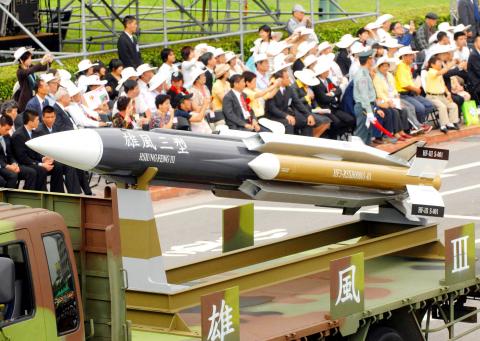The Taiwanese anti-ship missile that was accidentally launched last week, hitting a Taiwanese fishing boat and killing its captain, is a powerful weapon in which foreign nations have expressed interest since the Paris Air Show last year, a source in the Ministry of National Defense told reporters.
The source said the Hsiung Feng III is the mainstay of the Taiwanese military’s ship-killing arsenal, and one of the few supersonic anti-ship missiles in the world to be independently designed and produced, making it a desirable item in the global arms market.
However, the ministry does not foresee the possibility of selling the Hsiung Feng III to other nations, as the missile has just entered mass production and is a restricted weapon whose export is constrained by factors outside of the ministry’s control, the source said.

Photo: AFP
Researched and developed by the Chungshan Institute of Science and Technology, the Hsiung Feng III has a maximum effective range of between 130km and 150km, while a new extended-range model has a range of more than 300km.
When the institute became a legal entity under the control of the Executive Yuan, it was directed to showcase Taiwan’s defense technology to the international community, and has since then actively participated in international aeronautic exhibitions, the source said.
Several potential buyers made inquiries through intermediaries about the weapon’s technical specifications following the deadly mishap, the source said.
Because it is an aircraft-carrier-killing weapon, the nation’s allies have repeatedly expressed interest in it during joint military events, the source said.
Even at the research and development stage of the missile, representatives from foreign government agencies and arms makers contacted the government and the institute about Taipei’s willingness to sell the weapon or technology related to it, the source said.
The Taiwanese military’s purchase program for the Hsiung Feng III ran from 2007 to last year, and had a total budget of NT$11.89 billion (US$368.3 million), including deployment costs.
The commonly cited price of NT$100 million for 120 missiles is a misconception, the source said, because it fails to take into account the added cost of refurbishing facilities and one-year’s supply of spare parts.

INVESTIGATION: The case is the latest instance of a DPP figure being implicated in an espionage network accused of allegedly leaking information to Chinese intelligence Democratic Progressive Party (DPP) member Ho Jen-chieh (何仁傑) was detained and held incommunicado yesterday on suspicion of spying for China during his tenure as assistant to then-minister of foreign affairs Joseph Wu (吳釗燮). The Taipei District Prosecutors’ Office said Ho was implicated during its investigation into alleged spying activities by former Presidential Office consultant Wu Shang-yu (吳尚雨). Prosecutors said there is reason to believe Ho breached the National Security Act (國家安全法) by leaking classified Ministry of Foreign Affairs information to Chinese intelligence. Following interrogation, prosecutors petitioned the Taipei District Court to detain Ho, citing concerns over potential collusion or tampering of evidence. The

NEGOTIATIONS: Taiwan has good relations with Washington and the outlook for the negotiations looks promising, Minister of Economic Affairs J.W. Kuo said Taiwan’s GDP growth this year is expected to decrease by 0.43 to 1.61 percentage points due to the effects of US tariffs, National Development Council (NDC) Minister Paul Liu (劉鏡清) said at a meeting of the legislature’s Economics Committee in Taipei yesterday, citing a preliminary estimate by a private research institution. Taiwan’s economy would be significantly affected by the 32 percent “reciprocal” tariffs slapped by the US, which took effect yesterday, Liu said, adding that GDP growth could fall below 3 percent and potentially even dip below 2 percent to 1.53 percent this year. The council has commissioned another institution

NEGOTIATIONS: The US response to the countermeasures and plans Taiwan presented has been positive, including boosting procurement and investment, the president said Taiwan is included in the first group for trade negotiations with the US, President William Lai (賴清德) said yesterday, as he seeks to shield Taiwanese exporters from a 32 percent tariff. In Washington, US Trade Representative Jamieson Greer said in an interview on Fox News on Thursday that he would speak to his Taiwanese and Israeli counterparts yesterday about tariffs after holding a long discussion with the Vietnamese earlier. US President Donald Trump on Wednesday postponed punishing levies on multiple trade partners, including Taiwan, for three months after trillions of US dollars were wiped off global markets. He has maintained a 10 percent

TRADE: The premier pledged safeguards on ‘Made in Taiwan’ labeling, anti-dumping measures and stricter export controls to strengthen its position in trade talks Products labeled “made in Taiwan” must be genuinely made in Taiwan, Premier Cho Jung-tai (卓榮泰) said yesterday, vowing to enforce strict safeguards against “origin laundering” and initiate anti-dumping investigations to prevent China dumping its products in Taiwan. Cho made the remarks in a discussion session with representatives from industries in Kaohsiung. In response to the US government’s recent announcement of “reciprocal” tariffs on its trading partners, President William Lai (賴清德) and Cho last week began a series of consultations with industry leaders nationwide to gather feedback and address concerns. Taiwanese and US officials held a videoconference on Friday evening to discuss the